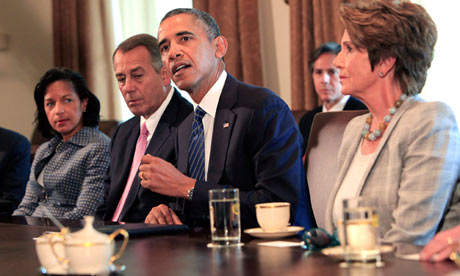President Obama has headed up a lobbying and public relations blitzkrieg for bombing Syria that seems to surpass any legislative effort of his presidency besides healthcare reform. Why?
If Congress refuses to authorize Obama's proposed bombing, it will be the first time it has stopped a president from going to war. For those who want the United States to be an empire, that is a scary thought.
These people are very worried about US "credibility," which is not the credibility of a law-abiding government but that of a mafia boss to mete out vigilante "enforcement of international norms" (they can't say "international law" -- as UN Secretary General Ban Ki-Moon pointed out, an attack on Syria would clearly be illegal). But allowing a congressional vote has unleashed a swarm of debates, such as: should the US be the world's policeman? (itself an unfair analogy to millions of real police officers who work to keep the peace and enforce laws fairly); what exactly are "US interests" in another country's sectarian civil war?; doesn't foreign military intervention generally make these conflicts worse?; isn't diplomacy a better option for resolving what has become an international conflict?; and why should we believe our government when it makes unsubstantiated claims about reasons for a war?
Such challenges have been suppressed for 12 years, since 9/11 provided a powerful new pretext for what our government has done abroad for a century. But they have simmered uneasily among the public, and a sizeable share of that public is now organized and putting the fear of mobilized public opinion into their elected officials, including Congress and the president.
This country has a powerful, politically diverse antiwar movement that is flooding Congress with phone calls, letters, and visits. You can see the impact of that movement in the media counts of the likely congressional votes, now standing at about 248 "No" or "Likely No" in the House of Representatives, versus 50 "Yes" or "Likely Yes." A coalition of groups on the left, including the 8m-strong membership of Moveon.org, has mobilized tens of thousands of phone calls to Congress and antiwar vigils in 224 American cities. On the right, the libertarian Campaign for Liberty and allied groups have helped push Republicans into the no camp -- not just with phone calls, but with threats of primary election challenges.
The fear among the undecided even includes Senate minority leader Mitch McConnell, a Kentucky Republican who previously had never met a war he didn't like. It was this fear, and unprecedented international isolation, that spurred Obama to seek congressional backing. Without such backing, a war that went badly could have serious political repercussions; and the chance of an unpredictable escalation of US involvement is significant. Although Obama said on Monday that he "hadn't decided" whether he would go ahead anyway without congressional approval, that is bluff; it would certainly bring impeachment moves in the House -- which could be quite unpleasant, even if the president were protected in the Senate.
The war party includes what one administration official told the New York Times was "the 800-pound gorilla in the room" -- AIPAC (the powerful pro-Israel lobby group). That's a lot of political muscle for this war, but it's a tough sell. McClatchy News reports how the administration's argument is "riddled with inconsistencies and hinges mainly on circumstantial evidence." Award-winning investigative journalist Gareth Porter shows that:
"[T]he Syria chemical warfare intelligence summary released by the Barack Obama administration August 30 did not represent an intelligence community assessment, [but appears to be] more politicized than the flawed 2002 Iraq WMD estimate that the George W Bush administration cited as part of the justification for the invasion of Iraq."
Florida Democratic Congressman Alan Grayson writes in the New York Times that even the classified version shown to members of Congress doesn't present any of the underlying evidence. People who were right about the Iraq war are raising huge doubts about the administration's case for war.
Obama said Monday that he was "not confident" that he would win this vote in Congress -- a stark admission of the new reality. But by leading a "full-court press" for the war, he has insulated himself from pro-war establishment backlash if the Congress votes no. He can say that he tried, but that Congress would not support him.
The majority of Americans has long seen the Iraq and Afghanistan wars as not worth fighting. But now, the majority has elected leaders running scared. If that trend continues, an untold number of people who would otherwise be killed by unjustified US military intervention in the future could be saved.
If there's a diplomatic deal over Syria's chemical weapons stocks, credit the people who opposed a rush to war -- including many members of the United States Congress.






